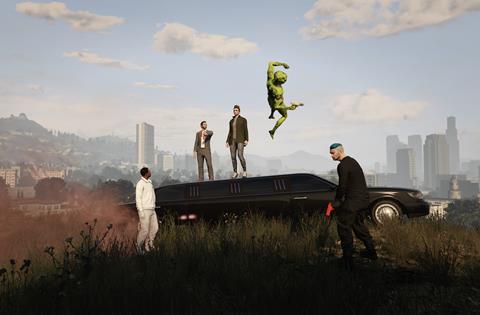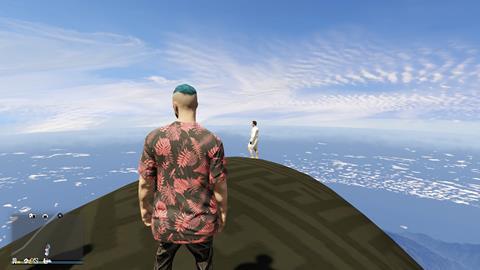A fun lockdown project turned into a festival and awards smash for debut filmmakers Pinny Grylls and Sam Crane.
Theatre is a delicate business. At any moment, the vagaries of life may impact on the performance – perhaps in the form of an audience-member illness, or an incursion by protesters. But, as they say, the show must go on. In 2021, this maxim took on a whole new level of meaning for London-based actors Sam Crane and Mark Oosterveen, who were determined to put on a production of Hamlet to help alleviate the creative- and career-based frustration of the UK’s third pandemic lockdown.
As documented in a film by Crane and his filmmaker wife Pinny Grylls, the actor pair’s production of Shakespeare’s Danish tragedy was a promenade affair, ambitiously staged in a variety of locations around the crime-ridden US city of Los Santos. One of these was, rather perilously, the top of a blimp, which would soar high in the sky above the bullet-pocked metropolis to provide a backdrop of spectacular views.
Crane and Oosterveen planned it out meticulously, anticipating likely mishaps. “But we weren’t imagining that the whole blimp was going to blow up and everyone would die,” says Crane.
For that is exactly what happened: the blimp exploded suddenly, taking the entire cast and audience with it. However, even that could not stop this unique production. “The amazing thing was we managed to get everyone back,” says Crane. “The show must go on, and the show did go on.”
Of course, nobody had actually been blown up. Only their digital avatars, who were performing the play in the virtual urban environment of the popular video game Grand Theft Auto Online (where death is not permanent, just an inconvenience).
Still, the exploding blimp is a definitive moment in Crane and Grylls’ literally homemade documentary Grand Theft Hamlet, which charts Crane and Oosterveen’s efforts to bring Shakespeare to a video-game world, and unfolds onscreen entirely within the game. It is surprising, extreme and emblematic of just how crazy this whole endeavour was.
Origin tale

Grand Theft Hamlet came about because, for a time, the show really could not go on. Crane had just landed a part in West End play Harry Potter And The Cursed Child when the third UK lockdown was announced in January 2021, and he felt like a huge opportunity had been scuppered. “Everything’s shit,” he says in the film. “I have nothing now.”
Like so many, he took refuge in an online world via his games console – the only way he could get together with friends like Oosterveen. Here, following a close scrape with the Los Santos police, the pair stumbled across the Vinewood Bowl: a huge empty arena with a stage and tiered seating.
As their avatars trod the virtual boards, an idea formed: why not put on a show here? They would audition, rehearse and perform it all in-game. After all, as Crane notes, “the level of detail in the game is far beyond what you need to play the [game’s] missions”.
Developer Rockstar (based in Edinburgh, Scotland) had created “this immersive world that you can just go and exist in”. Furthermore, the game’s visually impressive yet brutal environment suggested the ideal play: Hamlet. “Its mix of beauty and violence felt like the rotten state of Denmark,” says Crane. “It just seemed to fit so perfectly.”
Grylls, who has made a number of short films over the past decade and a half, saw this, too. Which is part of the reason why she felt compelled to join the game despite never having played it before, and digitally record the efforts of her husband and his friend.
“Hamlet talks about dissonance,” she says. “He feels like everybody is just pretending to be something they’re not. He’s almost saying we’re living in a simulation. So there are lots of layers.”
As Grylls started observing Crane and Oosterveen, and recording their sometimes-chaotic interactions with other players, she realised, “Wow, this is incredibly funny. It’s very dramatic. It’s really interesting. What’s going to happen? Are they going to be able to do this?”
She originally envisioned it as a short film, and applied to the BFI Doc Society’s Made of Truth fund. But on realising this was “a big, epic story with so many characters and so much happening”, she and Crane expanded it to a feature.
They used some of the original footage as a proof of concept to enlist the help, says Crane, of “some amazing exec producers in America who were great at finding other pots of money – some equity, some grant money”. Rockstar had no direct involvement, but was “very supportive”, says Crane. “I think the fact we were using the game in this very creative way appealed to them.”
The project’s expanded scope pushed Grylls to make it “really cinematic”, a challenge given the limitations of the gameplay-footage format. However, Grand Theft Auto Online has a function where your avatar is able to use a phone to record things in relatively sophisticated ways. “You can change the size of the shot, you can do close-ups,” says Grylls, who started exploring the environment and recording its landscapes and often-dishevelled non-player characters.
“I spent a lot of time on my own, just collecting imagery,” she adds. “Because any filmmaker worth their salt has to establish a sense of place and atmosphere within the film.” More challenging than shooting the footage was achieving a viable sound mix: “We had to record voices separately and there were issues around that.”
And more challenging than that was the edit, which required sifting through hundreds of hours of footage and condensing it into a 90-minute story. It was too much for the editor they originally brought on board, so Grylls got stuck in herself. “No-one else is going to be able to crawl through this jungle but me,” she reasoned.
Grylls’ travails with the edit came to parallel Crane and Oosterveen’s struggle to pull off Hamlet in such an inherently anarchic domain, where anyone can run in and start shooting up the scene at any moment, let alone the more mundane difficulties of casting and scheduling.
“As you see in the film, the challenges felt almost insurmountable at times,” says Crane. But the very fact they were making a film about it helped spur them on. “It gave us a certain energy and the necessity to continue,” he adds.
Produced by Julia Ton of Project 1961 and Rebecca Wolff of Grasp The Nettle, and financed by BFI Doc Society alongside Park Pictures, Altitude Films (which is selling) and Spark Features, Grand Theft Hamlet received its world premiere at SXSW in March, winning the grand jury award for documentary feature and going on to hit festival hotspots including CPH:DOX, Hot Docs, Sitges and BFI London.
Tull Stories released in the UK on December 6, and Mubi has global streaming and US distribution rights. The film received four nominations at the British Independent Film Awards, and is now vying for glory at the Bafta Film Awards.
“We can’t quite believe this is happening,” marvels Grylls. “We basically made this film in our bedroom. We didn’t think anyone would be interested. I’ve been trying to make my first feature for a very long time. I never dreamed that my first film would be made inside Grand Theft Auto. I mean, I’m not even a gamer.”
While Crane and Oosterveen are, once again, getting by fine as actors (Crane did eventually appear in Harry Potter And The Cursed Child), Grylls has new projects she is developing, including a film titled Hear My Voice “about a young boy growing up in Hackney who wants to be an opera singer,” she reveals.
“But also we are exploring things together – and in the digital space, too. So there are lots of exciting things happening.”

























No comments yet